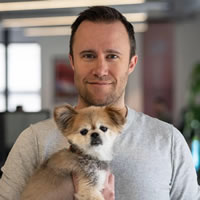Richard White Podcast Transcript
Richard White joins host Brian Thomas on The Digital Executive Podcast.
Welcome to Coruzant Technologies, Home of The Digital Executive Podcast.
Brian Thomas: Welcome to The Digital Executive. Today’s guest is Richard White Richard White is founder and CEO of Fathom.video, a free app that records, transcribes, and highlights your calls. So, you can focus on the conversation. Instead of taking notes, fathom dot video was a part of the Y Combinator W21 batch, which is 1 of only 50 zoom app launch partners and is 1 of a small handful of companies.
Zoom has invested in it directly via their zoom apps fund. So, Prior to Fathom. video, Richard founded UserVoice, one of the leading platforms that technology companies from startups to the Fortune 500 use for managing customer feedback and making strategic product decisions. UserVoice was notable for being the company that originally invented the feedback tab shown on the sides of millions of websites around the world today.
Well, good afternoon, Richard. Welcome to the show!
Richard White: Thanks for having me!
Brian Thomas: You bet. I appreciate this. Making the time hailing out of California there. I know we’ve got a little bit of a time difference here in Kansas City, but I do appreciate you making the time Richard and Richard jumping into the first question here, your early work at Eco, if I pronounce that correctly, placed you at the forefront of the Y Combinator batch.
How did this experience shape your approach to entrepreneurship and influence your future projects? Thanks.
Richard White: Great question. So yeah, a very fortunate experience. Honestly, early in my career to stumble upon these people building this online calendar called Kiko. Kind of old emailed them, got onto the team and then, you know, it was two founders and me at the time.
And you know, why comment is obviously well known today. It’s one of the biggest kind of seed funding organizations in the world with companies like Dropbox and Airbnb and stuff like that. But you know, 15 years ago when I worked there, it was just, you know, 10 people in a room working on startup stuff.
And I’m from North Carolina. Originally, I did some startup stuff. I tried to do my own kind of like businesses growing up, but never really found a community of people that were like minded kind of like tech entrepreneurs. And I got really fortunate. I stumbled into this group of folks, you know, hacking on random websites in a kind of a small office in Cambridge, Massachusetts, the Y Combinator office.
And so, I think. You know, really how it helped me is it got me into this amazing tribe of people that are building tech products. You know, I, the folks I worked on Kiko with went on to find a company called Twitch, which I think probably a lot of people have heard of. And that same office also had, was where Reddit was born.
And so, you know, I moved out to California with basically all of those folks and really got into California in 2006 in between. You know, the boom cycle of the nineties and the boom cycle, the 20 teens, it was kind of dead here, but I was just really deeply embedded in this like really amazing startup community.
And I think that more than anything, being surrounded by people that are some amazing tech founders from that era has been probably the most formative thing in my career.
Brian Thomas: That’s awesome. I appreciate you sharing that. I know sometimes you have a passion for something and you’re just not in the right community, right?
You have got to go out and find who that is. And I’m glad that you were exposed to like-minded entrepreneurs and investors that helped catapult your businesses today. So, I appreciate that. And Richard, you founded user voice, which became a leading platform for managing customer feedback. Can you share what inspired you to create user voice? And how you saw the need for such a platform in the market.
Richard White: Yeah. I mean, I think the common thread amongst all the companies I’ve started is they generally have solved my biggest problem I had at my, the previous company. You know, I was frustrated with calendaring and then I went to work at Kiko at Kiko, I was frustrated with trying to field lots of customer feedback.
We had thousands of users and there was a three-person team. And so we just really had a hard time getting on top of what people are telling us, you know, the biggest problems are, what features should we build that sort of thing. And I mentioned working on Kiko, we shared the office with Reddit. And so, user voice origin is kind of like Reddit for product feedback.
And you know, that was kind of the whole inspiration. It’s like, oh, it’s solved this problem. And you know, I think when I started Fathom, which, you know, sort of about four years ago versus Kiko, sorry, versus user voice, which started about 15 years ago, My sort of father was much more intentional about sizing the market before getting started, but with user voice, it was much more of like, I built it to solve my own problem.
And I mentioned kind of the startup community I was in, in San Francisco, and then I gave it to five friends, and they really liked it, and they gave it to five friends who really liked it. So, it’s much more organic. And I think, but it was very clear. We built the first version of user voice and within like three months I had, you know, 20, 30 different, you know, Friends, startups that were all using it and loving it.
And I was like, okay, there’s something here. And that was like a good signal to keep pressing forward on it.
Brian Thomas: Thank you. Does help our audience. We have a lot of entrepreneurs in the audience, not technologists, but really the culmination of all of your experiences and exposure and launching different things certainly helps.
A lot of our folks in our audience. So, I appreciate that. And Richard Fathom that video was one of the only 50 zoom app launch partners and received investment from zoom’s app fund. How did this partnership come about and what has it meant for Fathom’s growth?
Richard White: Yeah, it’s interesting. Like I mentioned, you know, Fathom being kind of the second really serious company that I started myself as the founder.
These always being the 1st, it’s much more intentional about distribution. I think my buddy Justin, who was founder of Twitch and Kiko has his saying, you know, first time founders think about products. Second time founders think about distribution, which I just love that quote. I think it’s very, very on point.
Yeah. And, you know, we, we had this, it’s funny, we had this theory about how we were going to get basically viral adoption with Fathom, which we actually have, right. It’s very much spreads word of mouth. The hardest problem about word of mouth or viral based, you know, distribution strategies is how do you get the first, you know, thousand, 10,000, a hundred thousand users, right.
It’s got what we call a cold start problem. And, you know, Literally, I think three weeks after we started fathom and we just like, you know, we didn’t have a theory for the cold start problem. We just, we’re like going to grind it out by messaging network, people in network and stuff like that. Zoom announced they’re building this marketplace and building this whole new kind of like plugin architecture to build apps into the zoom client.
And it was kind of crazy. Like I, you know, it was one of those moments where it’s like, oh gosh, we’re three weeks in. This is exactly what we need. Like we need to be building on this platform. They just announced this. It’s going to go live in three months and there’s already 30 companies signed up to build on it.
And we’re not one of them. Right. And we’re a startup with the end. Three people in a beta product, so very fortunate in that you know, I went on a mission to that. We got to get ourselves into this program and obviously any mark marketplace, right? Any app store that opens up is a really unique opportunity.
Very rarely, you know, if you were there the early days of the, you know, Facebook, Facebook apps or early days of, you know, the Apple store, right? Like, you know, it’s really tough to venture into this marketplace late, but you get there early in the crowd for the super viable. So, we hustled really hard.
Okay. I basically raised money from anyone connected to zoom to try to like, get some inroads into zoom and eventually just kind of ended up figuring out who was running that program and cold emailed him and was like, hey, we’re building this, this app. I think it’d be a great fit for your new zoom app marketplace.
You know, just made the pitch, right? And, you know, again, luckily enough, he read that email and was like, wow, yeah, that sounds like a great product. We’d love to have you on the platform. And so obviously it’s been huge for our growth. Zoom is our number one partner. They’ve put so much wind into our sales over the last three years.
It’s just incredible why we, you know, we would be light years behind where we are now, if not for that. So, you know, it just took a lot of, it’s too little hustle, a little bit of luck to get involved, but it’s been huge.
Brian Thomas: Thank you. I appreciate that. Really do and I know there’s a lot of effort. It seems you know; they always say that easier said than done.
And I know as an entrepreneur that you put a lot of heart and soul, sweat and tears into this to get there. It just didn’t happen, you know, happenstance. So, appreciate that. And Richard, last question of the evening here. Given your background in productivity and user experience design, where do you see the future of productivity tools heading? Especially with the integration of AI and machine learning technologies.
Richard White: I mean, I think we’re in the early innings of probably the craziest revolution in software, probably my lifetime. As you know, I, you know, I started really working on software in earnest, you know, mid two thousand and the big shift in the mid two thousand was open source software.
Open-source software came along, and it dramatically reduced the cost to build an app. You know, it went from, you’re going to have 10 engineers and 5 million just to build a website or a really crappy kind of web app to, you know, one person on a weekend with open source can build the same app now, right.
Per a hundred bucks sort of thing. I think AI is going to do have that same impact. But on the rest of the business, right? Like, you know, open source help you build software faster. AI is going to help you build companies faster. And, and with leverage that we haven’t seen before, I think everyone now is kind of scrambling to think how they rethink their entire org structure with AI in mind.
Because, you know, from a societal perspective is a little scary from a from a from a technology perspective, it’s pretty exciting, right? It’s like a lot of things you typically have to hire people to do. The AI can do literally today. And it’s progressing at a rate where it’s, you know, it’s almost graduating a grade.
You know, if it was a child, like every 6 months sort of thing, right? So, it’s like a, you know, it’s an 8th grader. Now it’s going to be graduating high school in about 6 months sort of thing. So, it’s pretty wild. And I think it’s going to; I think every single productivity category is going to get rethought from 1st principles with time.
How would you do this? If you had basically a, you know an AI in the loop. And so, I think I’m seeing tons of folks that were, you know, maybe aggressive founders people that were in venture get back in the arena of entrepreneurship, tech entrepreneurship, because it’s such an exciting kind of gold rush.
And there’s, there’s real, real utility there. This isn’t, this isn’t crypto. There’s real stuff happening, real use cases happening that are touching the real world. So, it’s pretty exciting.
Brian Thomas: It really is exciting and, you know, we saw chat GPT 4 Oh come out just this week, or at least the video seemed to be coming out this week.
You know, you talked about productivity, but, you know, I, I caught on to something here that you’ve mentioned just a second ago about how I can help build companies build products. That’s the exciting part. And I think you hit the nail on the head, and I had not heard that. And I’ve done. Probably 200 podcasts on AI just in the last year.
So do appreciate that highlighting that and Richard, it was such a pleasure having you on today and I look forward to speaking with you real soon.
Richard White: Well, thanks for having me. It’s a lot of fun.
Brian Thomas: Bye for now.
Richard White Podcast Transcript. Listen to the audio on the guest’s podcast page.











